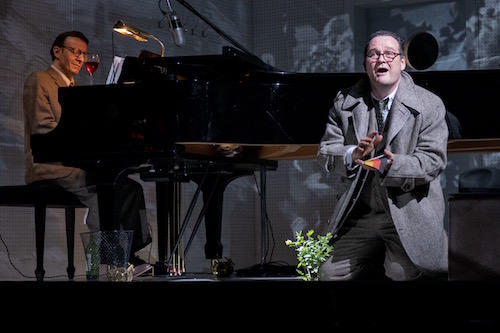 Luminato presents a song cycle, chronicling the life of composer Hanns Eisler, in Toronto
Luminato presents a song cycle, chronicling the life of composer Hanns Eisler, in Toronto
Hell’s Fury, The Hollywood Songbook, a co-production between Soundstreams, Pinkhouse Productions, Opera North UK and Luminato as part of the 2019 festival, is an intimate journey into the life of composer Hanns Eisler, written by the man himself.
Eisler, well-known for composing both Hollywood movie scores and the East German national anthem, was an Austrian born to a Jewish father and Lutheran mother. Moving to Berlin after serving in the first World War, he joined the Communist party and worked with Bertolt Brecht, scoring his plays and writing protest songs. Exiled by the rising tide of Nazism, which made his music illegal, he eventually emigrated to the United States, again working with Brecht, scoring 40 films, and receiving two Oscar nominations. He left the US after being blacklisted following interrogation by the House Committee on Un-American Activities. Fleeing to East Berlin, he found himself celebrated and then silenced by a Communist party that did not hold to his principles.
The “Hollywood Songbook” song cycle was written by Eisler as a project largely intended for his ears only, so it feels slightly voyeuristic on our part to be watching these incredibly personal songs take shape on stage. Together, the songs present an interesting portrait of a man in interesting times, who was caused great pain from continually losing his roots, driven out by fascism, capitalism, and communism alike. They provide the material for a powerhouse performance by baritone Russell Braun. Unfortunately, they are also relentlessly lugubrious, essentially a 75-minute dirge with little variation.
This is a personal, introspective song cycle, so while deviser and director Tim Albery does an admirable job arranging them in order to loosely follow the trajectory of Eisler’s life, it exists in a liminal space between bio-musical and concert, unwilling to be either. Since the show has the framing of a bio-musical but isn’t really meant to function as a bio-musical, the absence of large sections of Eisler’s compositional life, such as his early protest work with Brecht and movie scores, feels more notable than if the evening were more clearly a concert. While it appears that Eisler considered many of these scores cash grabs written for silly and trifling films, I found myself wanting to experience that side of him, and I imagine many who are not intimately familiar with Eisler’s movie work might also be interested in hearing both “Hollywood Songbooks.”
Musically, Eisler was a student of Arnold Schoenberg, and his teacher’s passion for the atonal and chromatic is in full force here. There is nuance, of course, but even with my background as a classical singer, I found mostly aural similarities. The only piece that really breaks with this style is, ironically, the East German national anthem, which seems oddly stirring in comparison to the rest of the selections; uncomfortable, given the politics involved. Ultimately, more detail could be revealed to the audience in between Eisler’s laments on human greed and man’s inhumanity to man.
The show’s use of technology and design (Michael Levine and Cameron Davis) is impressive. A starkly white recording studio becomes the canvas for projections: film clips, maps, Hollywood palms. A clock becomes a moon and back again, as the time winds down on each stage of Eisler’s life. Braun switches between English and German, and captions effectively translate the latter, including an important pun involving the title. Stalin’s expanding head is hollowed out by the studio’s window. Braun is as mercurial as the shifting projections; absolutely throwing himself into the part, he seethes with sorrow, sarcasm and rage.
In the end, though technically and vocally virtuosic, this is a lot of conceptual anger and suffering to take without additional mitigating, rounding and humanizing moments, and is probably largely of interest to fans of Schoenberg’s school of composition. We feel Eisler’s pain because the terrible injustice of the situation demands it; we cannot feel otherwise, but I yearned to feel and understand more. My favourite moment may have been a tiny throwaway second at the very start of the show, a moment of humourous defiance where virtuoso pianist Serouj Kradjian unceremoniously snatches the Nazi flag off the miniature flagpole atop the piano before they begin. It reminded me that sound and fury certainly signify something…but not everything.
Details:
- Hell’s Fury, The Hollywood Songbook plays until June 23rd at the Harbourfront Centre Theatre (231 Queens Quay W)
- Shows run Thursday-Saturday at 7:00PM, with a Sunday 2:00PM matinee.
- Tickets are $30-95 and can be purchased online, by calling 416-368-4849, or at the Festival Box Office.
Photo of Serouj Kradjian and Russell Braun by Trevor Haldenby
